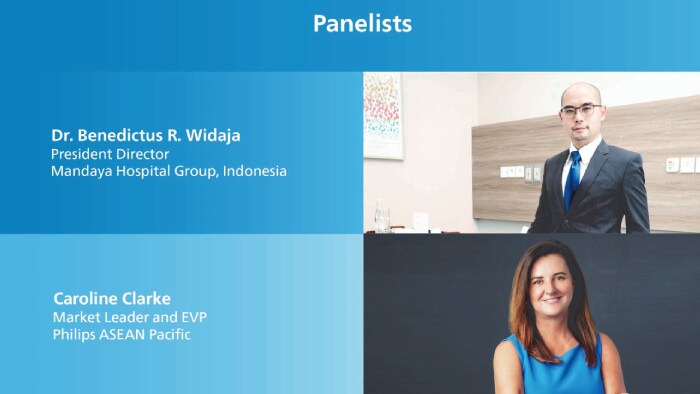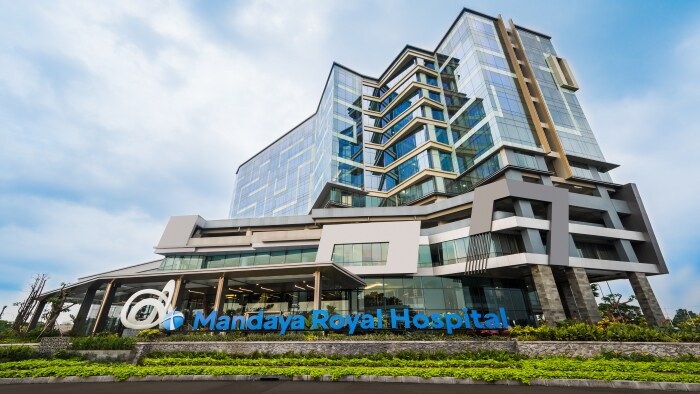Singapore – 2020 has been a year like no other, with the global pandemic placing unprecedented strain on frontline workers, and senior leaders having to make decisions under the most difficult circumstances. As healthcare leaders draw on the lessons learnt and the accelerating revolutionization of healthcare innovation, it’s vital to also explore how healthcare systems can build sustainable digital systems to deliver future-proof care. Caroline Clarke, Market Leader and EVP, Philips ASEAN Pacific, together with Dr Benedictus Widaja, President Director, Mandaya Hospital Group, expanded on this further at a recent keynote session at Hospital Management Asia (HMA) 2021, which was moderated by Datuk Dr Kuljit Singh, President, Association of Private Hospitals Malaysia.

The annual conference brings together healthcare leaders, hospital executives and thought leaders in Asia and around the world. This year’s theme, ‘Reimaging healthcare in the new normal’, examines how the healthcare industry can manage a new reality of COVID-19’s continued impact and prevalence, and how they can innovate themselves towards the future of care. Caroline and Dr Benedictus discussed the top challenges identified by APAC healthcare leaders and drew on the insights from Philips’ Future Health Index 2021 study to discuss how data management, a lack of interoperability, and financial or budgetary constraints can be overcome. While APAC’s healthcare industry had already begun its digital transformation, the pandemic has accelerated much-needed radical shifts in care delivery for both patients are providers and gaining new ground in recognising the growing importance of sustainability and environmental considerations for APAC’s healthcare leaders in the future.
Overcoming data management and interoperability challenges “Despite the positive acceleration of digital transformation, hurdles exist to realising these gains”, according to Caroline. “With the sheer volume of data, a hospital collects every day, there is a challenge in making the best use of the data to support physicians, drive efficiency and deliver patient outcomes. This includes managing, storing, and using confidential patient data as per local regulations”, she added. To build smart hospitals of the future, interoperable and secure data platforms are the basis for high impact and scalable health informatics, also fueling further innovation and research. However, 39% of healthcare leaders in APAC cited a lack of training to fully utilize digital technologies as one of the top barriers to the adoption of digital health technologies. The transparent capture and reporting of data between systems, processes and stakeholders are vital for value-based care, yet interoperability challenges remain a key hurdle, requiring a full-ecosystem approach. While aiming for future-proof care, integration is key to improving patient experiences throughout their healthcare journey – a pivotal area of focus also given the fast-evolving needs of patients and greater demand for more personalized, digital-first and patient-focused care. Dr Benedictus shared his experience, as the President Director of the newly-opened Mandaya Hospital in Indonesia, about overcoming interoperability challenges in building personalized integrated medical services around the wellness of the patient.

Dr Benedictus highlighted the importance of collaborative partnerships with vendors such as Philips to ensure integration for seamless workflows and a smooth patient journey. He said, “The patient journey has various digital aspects at Mandaya Hospital, from access to electronic health records at emergency rooms to diagnosis in MRI and radiology, to inpatient and outpatient monitoring tools. All these technologies not only work together to provide patients and their families the best experiences possible, but also allow clinicians to provide informed and efficient care to their patients.”
Investing in people and training for greater digital health adoption For effective and sustainable adoption, the end-users – the hospital staff – need to be nurtured and trained with these digital health technologies, which can then be used to their full potential. Around half of APAC’s healthcare leaders mention staff’s lack of experience with new technologies among the top internal barriers to future planning, whilst one in four say that staff shortages are holding them back. Despite this, surprisingly only 15% of APAC’s healthcare leaders say that addressing staff shortages is currently a top priority. However, for forward-looking hospitals such as Mandaya, Dr Benedictus stressed, “Ensuring staff are adequately trained in new technologies is crucial to maximizing the full potential of integrated clinical systems. Widespread digital health adoption requires digital literacy and buy-in from all management levels and investment in people and training is critical, especially in the face of the pandemic which has compounded issues of staff shortage and gaps in training. Just as we invest heavily in new technologies, we also have to invest in training hospital staff to use them to their full potential.” Caroline highlighted, “While APAC’s healthcare leaders are already investing in predictive technologies like AI and machine learning to accelerate and transform care, there is a greater need to train staff to utilize them beyond administrative functions like patient scheduling, to more patient-outcome focused areas such as integrating diagnostics or for clinical decision support. To support its customers’ commitment to providing the best possible care, Philips provides comprehensive training, to teach staff how to best use products, help educate them in clinical specialties, and provide non-clinical professional development. All of Philips’ courses are designed to help enhance operational efficiency and quality of care."
While APAC’s healthcare leaders are already investing in predictive technologies like AI and machine learning to accelerate and transform care, there is a greater need to train staff to utilize them beyond administrative functions like patient scheduling, to more patient-outcome focused areas such as integrating diagnostics or for clinical decision support.”
Caroline Clarke
Market Leader and EVP, Philips ASEAN Pacific
Widespread digital health adoption requires digital literacy and buy-in from all management levels and investment in people and training is critical, especially in the face of the pandemic which has compounded issues of staff shortage and gaps in training. Just as we invest heavily in new technologies, we also have to invest in training hospital staff to use them to their full potential.”
Dr Benedictus Widaja
President Director, Mandaya Hospital Group, Indonesia
Expanding care delivery outside of hospital walls Moving care delivery out of hospitals and into other settings, such as the home, has the potential to make care delivery more accessible and integrated into modern lifestyles for young and old patients alike. Caroline added, “Digital health can bridge the physical and virtual world to transcend traditional boundaries of care and ease the burden of hospitals. Developing virtual care strategies is something healthcare leaders are keenly focused on now. Healthcare leaders globally expect an average of 23% of routine care to still take place outside of the hospital walls three years from now, and the next frontier will be extending real-time care to those with acute needs and chronic condition management. Philips is proud to have brought new platforms to market before, such as in West Moreton Hospital in Australia.” Despite the disruptive impact of COVID-19, healthcare leaders in APAC are optimistic about the future – where nearly three in four are confident in the ability of their hospital or healthcare facility to deliver quality care as they look toward the future. The pandemic has accelerated healthcare’s digital transformation and surfaced many opportunities to reinvent care delivery into the future. As healthcare organizations set their sights on a resilient and sustainable future, ensuring that the intelligent solutions that are embedded in their operations are utilized to their full potential – unlocking the delivery of more personalized, effective, and cost-efficient patient care within and beyond their walls.
Caroline and Dr Benedictus agreed that digital technologies enabling virtual care, such as telehealth platforms and patient monitoring tools will grant patients greater access to care. Dr Benedictus shared, “Investing in the right technologies can therefore provide an advantage, allowing hospitals to expand their virtual bed capacity, enabling them to take on additional patients and offer a potential revenue boost.”
Share on social media
Topics
Contact
Jane Yeo Head of Communications APAC E-mail: jane.yeo@philips.com











